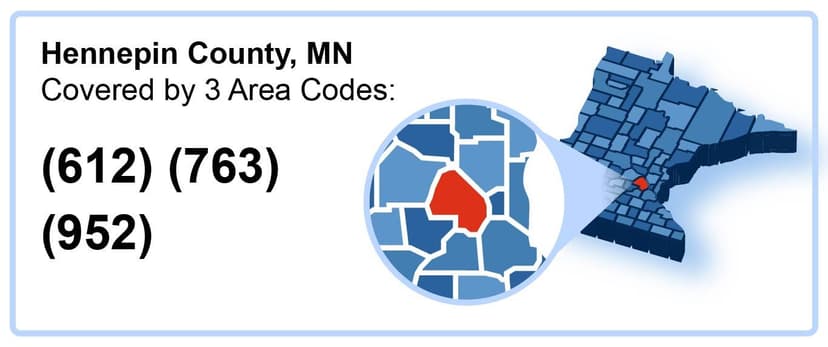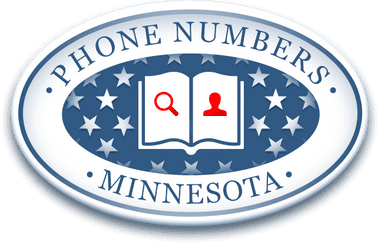What are Hennepin County Area Codes?

The block of three digits beginning a North American telephone number is known as an area code. They are administered by the North American Numbering Plan Administration (NANPA) and define a Numbering Plan Area (NPA) in a state. The Minnesota Public Utilities Commission (PUC) manages all Minnesota area codes.
Hennepin County has three active area codes, which serve the entire county and stretches of other adjoining counties in Minnesota.
Area code 612
Area code 612 is one of the original 86 NPA codes created in 1947. The 612 area code covers the City of Minneapolis and some neighboring areas like Richfield, Fort Snelling, and St. Anthony. It is the only area code that serves this area.
Area code 763
Created from area code 612 in 2000, area code 763 is the NANP numbering plan area for the northwestern communities of the Minnesota-St.Paul metro area. It stretches across Hennepin County cities like Champlin, Golden Valley, Plymouth, Maple Grove, and Brooklyn Park. It was activated for service in February 2000.
Area code 952
The 952 NPA also split from 612 at the same time as the 763 NPA. It is the Minnesota telephone area code in the NANP that serves the southwestern suburbs of Minnesota-St. Paul metropolitan area. Some of the Hennepin County cities under this NPA include Bloomington, Eden Prairie, Edina, and Minnetonka.
What are the Best Cell Phone Plans in Hennepin County?
Recent statistics from a 2018 CDC study indicate a significant shift towards wireless telephony services from traditional landlines, among Minnesotans. Among adults, 56.2% exclusively used wireless service for telecommunication while only 4.4% remained landline-only users. In the children (below 18 years) demographic cell phone-only users accounted for 63.2% of the population and exclusive landline users made up a mere 1.9%.
The four major phone carriers provide varying network coverages in Hennepin County. AT&T covers 97.4% of the county and has the widest coverage. Coverage by T-Mobile is also excellent at 94.5%. Verizon covers only 88.3% of the county, while Sprint caters to only 52.1% of the county.
Patronage for VoIP (Voice over Internet Protocol) services, which use the internet for calls, has also risen considerably in Hennepin County in recent years. This is due to the high proportion of residents who have access to broadband internet (about 99% of households). This widespread adoption of VoIP services even prompted attempts by the Minnesota Public Utilities Commission’ to introduce stiffer regulations for VoIP providers. Another notable driver for VoIP growth is the current effort of the Minnesota State Office of Broadband Development to guarantee broadband access to all Minnesotans.
What are Hennepin County Phone Scams?
These are the various dishonest schemes facilitated by phone calls directed at county residents. Phone scams are used by scammers to obtain confidential information from unwary residents to either commit identity theft or steal their funds. County residents who have suffered losses from scams can file complaints with the Minnesota Attorney General's Consumer Services Division or contact the FTC. Scams that are widespread in Hennepin County include:
What are Impersonation Scams?
In these scams, fraudsters call unsuspecting residents posing as local law enforcement agents and court officials. They inform them of pending bench warrants issued against them for missed court dates and jury duties. These phone scammers also notify residents that they will be immediately arrested unless they pay the associated fines. They instruct residents to make these payments using gift cards and other such unconventional methods.
The Hennepin County Sheriff’s Office (HCSO) informs residents that no law enforcement agency will request fees over unsolicited calls. Residents who have received these kinds of phone calls can contact the HCSO or their local law enforcement agencies. Also, a reverse phone number lookup can help ascertain who called.
What are Grandparent Scams?
Vulnerable and elderly Minnesotans are common targets of these scams, wherein scammers pretend to be grandchildren in emergencies who require urgent financial assistance. They aim to emotionally pressure these grandparents into impulsive decisions to help out family members. The false emergencies used in these scams include accidents, hospitalizations, arrests, and robberies. These scammers are compelling actors and may even provide certain information that makes them sound like the individuals they are impersonating. They also dissuade their marks from verifying their claims by insisting the matters remain secret. Individuals targeted by this scam can run callers’ numbers through reverse phone searches to retrieve identifying information like names and addresses. Residents targeted by this scam can file a complaint with the Hennepin County Attorney’s Office.
What are COVID-19 Scams?
The Minnesota Attorney General has raised the alarm over the upsurge in coronavirus-related scams. Using various schemes, scammers exploit the current global health crisis to deceive residents and steal from them. In one version, the scammers call their targets and offer to expedite the process of receiving stimulus checks for some fees. They may also request personal information to carry out identity verifications, claiming the victims are ineligible to receive payments if they do not comply. In another variant of these scams, fraudsters contact their targets under the guise of conducting contact tracing and request payments for test kits and treatments.
Residents are warned never to disclose confidential information over phone calls they did not initiate. Reverse phone number lookups can help shed light on suspicious callers’ true identities. Legitimate government agencies will also never ask for financial information during unsolicited communications. County locals who suspect COVID-19 scammers have targeted them should file their complaints with the Minnesota Commerce Department’s Consumer Services Center.
What are Computer Scams?
In these scams, fraudsters impersonating tech support staff of reputable IT firms call residents and inform them that their computers need urgent fixes. These purported problems can range from malware, computer hacks, and even impending system crashes. They convince their victims to grant them remote access to fix the issues for certain fees. Once given access, the scammer can steal the victims’ financial information or identities.
In another variation, scammers install malware that grants them remote control of their targets’ computers and demand ransoms to restore the victims’ access. They may also convince the victims to purchase unnecessary and expensive software solutions and repair services. If a computer scammer has reached you, report online to the Minnesota Attorney General’s Office or call (651) 296-3353. Another way to foil computer scams is to uncover their real identities using reverse phone searches.
What are Robocall Scams and Spam Calls?
These are phone calls programmed to convey recorded messages. Charities, debt collectors, and health organizations, like pharmacies, legitimately use robocalls for informational purposes. However, scammers have appropriated these communication tools to fish for targets for their cons. Using robocalls, fraudsters can anonymously place numerous calls to multiple residents at little or no cost. You can use a phone number lookup application to identify whether a robocaller is attempting to make contact.
The following are recommendations for dealing with robocalls:
- Get off the phone when contacted by robocalls. By following prompts provided during these calls, you are inadvertently confirming your number as active and ready for more robocalls.
- Inform the FTC by calling 1 (888) 382-1222 or sending an online complaint.
- Online public services that render free reverse phone lookup can verify robocall numbers. Use them to identify and block these numbers.
- Limit robocalls to your number by signing it up with the National Do Not Call Registry. Enlisted numbers are excluded from telemarketers’ and sellers’ calls, drastically reducing spam calls to your phone number.
- Ask your carrier for free call blocking tools and check to see if your phone provides features for blocking unwanted calls. Use these options to stop robocall numbers from ringing your phones.
Consumers can also find instructions on how to block unwanted calls on the FTC website.
How You Can Spot and Report Hennepin Phone Scams?
Unmasking a scammer undermines the success of their scam and makes it easy to find and prosecute them. You can reduce your chances of being scammed by using reverse phone number lookup services. However, fraudsters are constantly finding new ways to trick consumers, so the best defense against phone scams remains education and vigilance.
The following signs can often identify phone scams:
- Scammers prefer to request payment through non-traditional channels like bitcoin, gift cards, money transfer services, and preloaded debit/credit cards. This is because payments routed via these means are often untraceable and/or irreversible.
- Scammers often use coercive tactics to pressure their targets into divulging sensitive information. They claim to be law enforcement agents or federal employees but employ various threats to force your cooperation.
- The callers request for advance payment as prerequisites for receiving free gifts. Once you have to make upfront payments to receive gifts, they are no longer free.
- Investment offers that guarantee high returns while offering little or no risks are potential scams. Scammers use these attractive offers to lure in and defraud consumers.
- Scammers impersonate representatives of reputable companies to trick their marks into sharing confidential information over phone calls. Legitimate institutions do not ask for consumers’ financial information over phone calls unless you initiated the call.
Most public agencies have contributed significantly to the fight against phone scams and frauds. They help consumers by offering them support and up-to-date information about scams. Well-informed residents can use reverse phone lookups to retrieve personal identifying information on scammers like names and addresses.
The following government institutions are engaged in tackling phone scams:
Federal Trade Commission - The FTC protects consumers from fraudulent commercial practices. They pursue this objective by enforcing consumer protection policies and raising awareness. They also maintain the National Do Not Call Registry to tackle illegal robocalls. Consumers can complain online to the FTC or call 1 (888) 382-1222 if they have experienced unfair or illegal business practices.
Federal Communications Commission - The FCC is the federal agency that oversees domestic and foreign communication. They also ensure consumers’ safety by creating protective regulations. Hennepin County residents can discover how to stop unwanted robocalls and avoid phone scams from the FCC’s website. They can also file their grievances online with the Commission if targeted by scammers.
Hennepin County Attorney’s Office - The Hennepin County Attorney’s Office champions justice and provides scam prevention tips on identity theft to residents. Residents who have encountered identity-theft scams can notify the County Attorney on (612) 348-5550.
Hennepin County Sheriff’s Office - The Hennepin County Sheriff’s Office maintains peace in the county and warns residents of trending scams. Scammed victims within the county can file complaints with the Sheriff’s Office or their local law enforcement agency. Residents can also forward anonymous reports of suspicious activities online to the Sheriff’s Office or the Minnesota Crime Stoppers.
